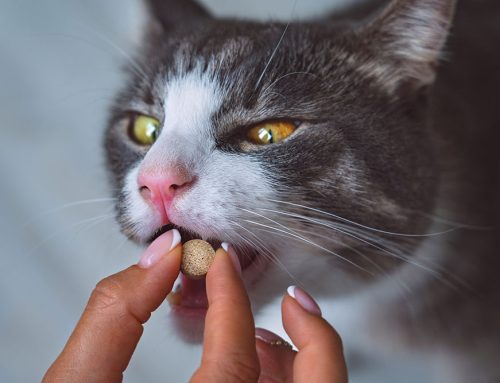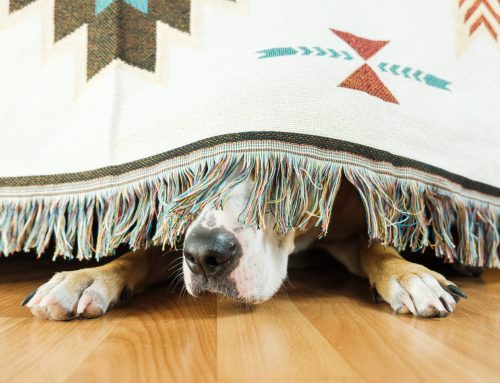Giardia is a protozoal infection that can cause gastrointestinal (GI) disease in pets and people. The microscopic organism is ubiquitous in the environment and can be found worldwide. Our Alisos Animal Hospital team believes education is key to improving pet health, and we answer frequently asked questions about this condition.
Question: What is Giardia?
Answer: Giardia is a single-celled microscopic protozoan that inhabits the intestines of mammals, birds, and amphibians. The organism exists in two forms:
- Trophozoite — The trophozoite stage lives, feeds, and multiplies inside the host’s intestine.
- Cyst — Trophozoites develop as cysts in the host’s colon, which is the infective stage, and the cysts are passed in feces and contaminate the environment.
Question: How is Giardia transmitted to pets?
Answer: An infected pet passes infectious cysts in their feces 5 to 12 days after infection in dogs and 5 to 16 days after infection in cats. Once in the environment, these cysts can infect other animals and pets. Transmission occurs by:
- Ingesting contaminated water
- Sniffing an infected pet’s hind end
- Ingesting contaminated food or plant material
- Grooming after sitting or rolling in contaminated soil
- Eating contaminated birds or small mammals
Question: What are Giardia signs in pets?
Answer: Many infected pets exhibit no signs but are still shedding infectious cysts in their feces. Signs that may be present typically include foul-smelling diarrhea that ranges from soft to watery, and excess mucus that is greenish tinged or bloody. The diarrhea may be intermittent and can cause weight loss if not treated. In some cases, vomiting may also occur.
Question: How is Giardia diagnosed in pets?
Answer: When your pet has diarrhea, our team may determine the cause with the following diagnostics:
- History — We take a detailed history to determine if your pet has a pre-existing condition or they potentially have been exposed to a pathogen or parasite.
- Physical exam — We palpate your pet thoroughly from head to tail, looking for abnormalities such as dehydration, fever, and abdominal discomfort.
- Blood work — We may recommend a complete blood count and biochemistry profile to assess your pet’s overall health and rule out other potential diarrhea-causing conditions.
- Parvovirus test — If you have a puppy or unvaccinated dog, we may perform a parvovirus test to rule out this dangerous viral infection.
- Fecal test — A routine fecal floatation can detect many intestinal parasites but may fail to exhibit the tiny Giardia cysts.
- Enzyme linked immunosorbent assay (ELISA) — An ELISA test can detect Giardia in a fecal sample.
Question: How is Giardia treated in pets?
Answer: The goal of Giardia treatment is to resolve the clinical signs. Treatments may include:
- Medication — Giardia is commonly treated with an anti-parasitic drug or an antibiotic, which we sometimes use in conjunction. Treatment is typically needed for 7 to 10 days.
- Diet — We may prescribe a special diet that supports digestive health.
- Bathing — Some Giardia cysts may remain in your pet’s fur and reinfect them when they groom, so thoroughly bathe your pet on the last day of treatment to help prevent reinfection. If they have long hair, consider trimming the hair on their hind end to ensure no cysts remain.
- Disinfecting — Giardia cysts that remain in your home can also reinfect your pet. Use disinfectants and steam clean all your pet’s resting and play areas.
Question: Can my pet transmit Giardia to me?
Answer: The Giardia species is composed of eight assemblages or subspecies, named A to H. Assemblages C through H are typically host adapted and can infect only animal hosts, while A and B can infect both people and animals. Most dogs are infected by assemblages C and D, and most cats are infected by assemblages C, D, and F. This means that you typically can’t get a Giardia infection from your pet, but you should still practice good hygiene if your pet is sick. In addition, keep children and immunocompromised people away from your pet until their infection is cleared.
Question: How is Giardia prevented in pets?

Answer: Not every Giardia case can be prevented, but you can take steps to reduce your four-legged friend’s risk, including:
- Scheduling regular wellness exams — Ensure your pet is evaluated by a veterinarian at least once a year, and that their stool is checked for parasites during the visit.
- Carrying water — On outings, carry bottled water so you can offer your pet clean water when they need a drink.
- Preventing contact — Don’t allow your pet to sniff feces and ensure boarding and doggie daycare facilities that you visit clean and disinfect their kennels and runs.
If your pet has diarrhea, contact our Alisos Animal Hospital team, so we can determine the cause of the problem and devise an appropriate treatment plan.








Leave A Comment